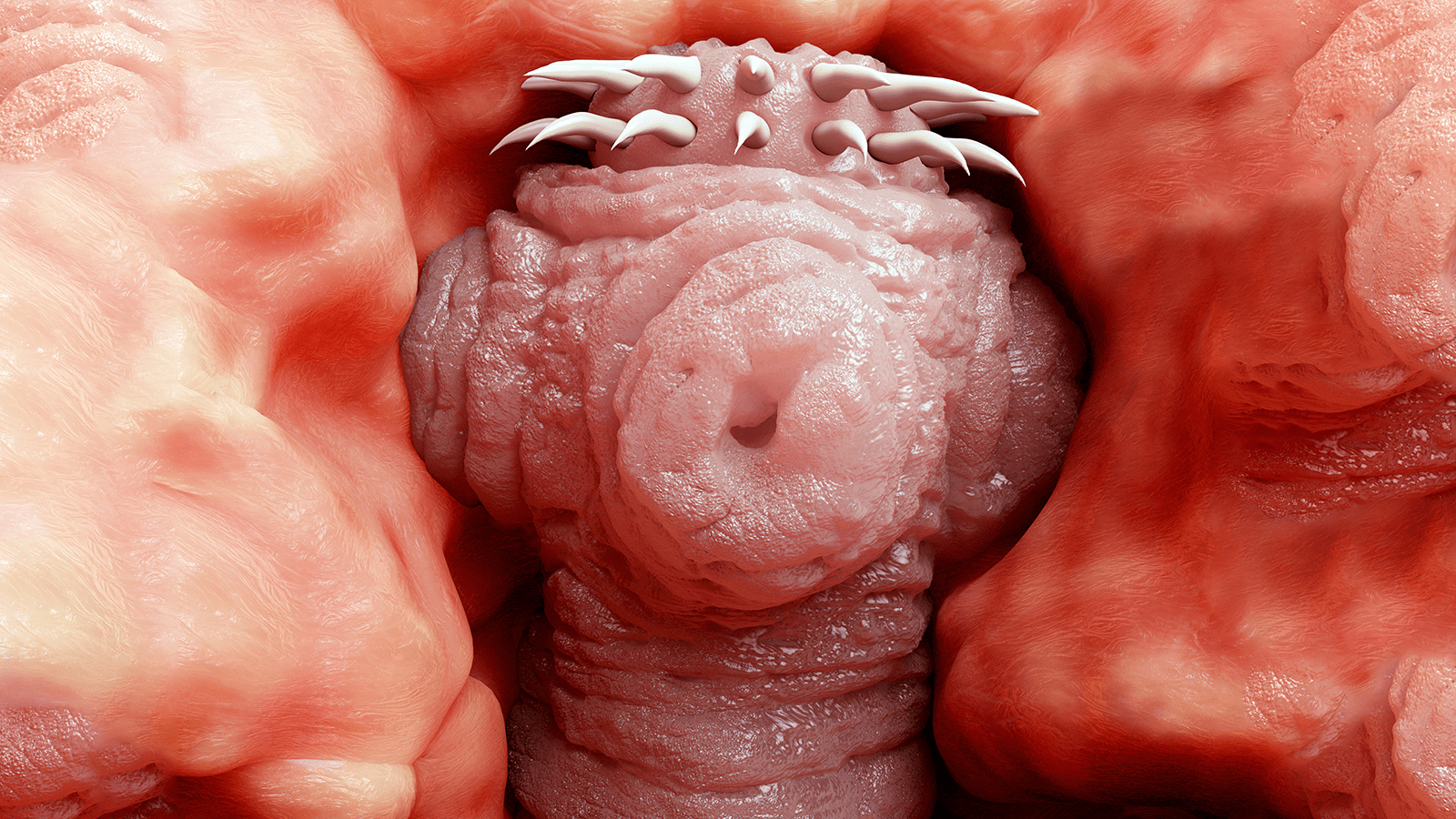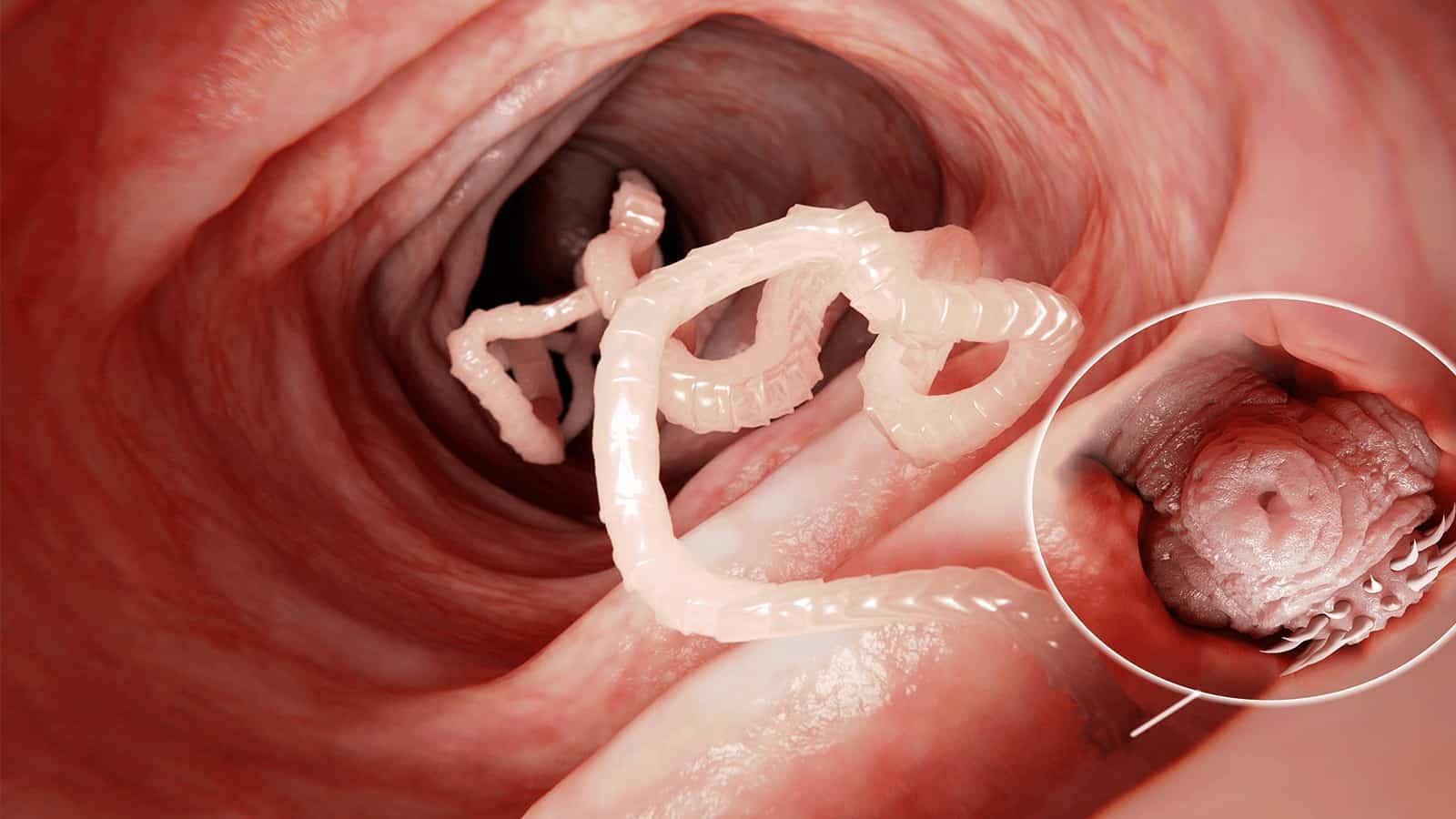Just in case the title was not enough of a warning, please know that this discussion contains information that’s a bit – how do you put it? – “sensitive” in nature. Yes, we are going to talk about the commonly known, but not often identified tapeworm. In order to keep nausea at a minimum, we will omit as many of the grosser details as possible.
What is a tapeworm?
A tapeworm is a long, whitish parasite that is acquired through the consumption of a tapeworm’s eggs. This can happen for various reasons, the most common being poor hygiene, and certain types of food – such as raw pork, beef and fish – or water containing traces of contaminated feces.
It is estimated that more than 1,000 species of tapeworms (Cestoda) exist. An adult tapeworm, like other worms, have a head, neck, and series of body segments that produce eggs (proglottids).
Tapeworms sustain themselves through the ingestion of food particles within the host’s digestive tract; something made possible through “hooks” used to penetrate the host’s intestinal wall. Astoundingly, tapeworms can live up to 30 years in the host (infected animal or human.)
Ten Early Signs of Tapeworm
The degree to which a person experiences symptoms resulting from a tapeworm infection depends on (a) the size of the tapeworm(s), and (b) the extent of the infection. For the most part, symptoms are either nonexistent or very subtle. Without further delay, here are ten early signs of tapeworm to never ignore:

Abdominal pain
Anytime there is something foreign living in the intestines, it is possible that abdominal pain will result. Abdominal pain from tapeworm infection is often described as sharp, shooting, and sudden pain that lasts for a long period and occurs regularly.
Dysentery
(Remember Oregon Trail? “You have died of dysentery.”)
Dysentery is inflammation of the intestine that usually produces symptoms such as blood and mucus in the feces. The condition is also known to cause chronic diarrhea. Inflammation of the intestines by bacteria or – as with tapeworm – infestation are the two leading causes of dysentery.
Epilepsy
A condition known as neurocysticercosis is caused by the ingestion of eggs from tapeworm Taenia solium or pork tapeworm. Taenia solium is one species of tapeworm that can invade the brain (disturbing!). When this occurs, the person may experience both headaches and seizures, or epilepsy.
Fatigue
Unusual tiredness is often reported by people with a parasitic infection. Experts think that this fatigue is due to loss of energy, caused by the heightened immune response needed to fight tapeworm infection. The loss of nutrients from a tapeworm infection is also a possible cause.
Feces that contain larvae
Hopefully it never gets to this point, but there you have it. Yes, you can excrete worms in fragments or as a whole.
Flu-like symptoms
Irritation of the gastrointestinal (GI) tract can lead to loss of appetite. Worse, a parasitic infection of this type can cause symptoms that mimic those of the stomach flu, including diarrhea, nausea, and vomiting.
Jaundice
Jaundice is a condition that causes yellowing of the skin or the white area of the eyes. As a tapeworm expands and takes up more space in the intestines, it can cause an obstruction of the bile duct. When this happens, it can produce an excess of bilirubin – a yellowish liver pigment – leading to jaundice.
Liver damage
Tapeworm larvae can escape the intestines and invade the liver. Left unchecked, these larvae can interrupt the liver’s function by interfering with blood flow. Per the Mayo Clinic, some of the most common symptoms of liver damage include abdominal pain, swelling of the ankles and legs, skin irritation, dark urine, chronic fatigue, and loss of appetite.
Nutrient deficiency
As mentioned, tapeworms acquire nourishment through the ingestion of food particles. A particularly bad infection can lead to a sizable loss of nutrients, leading to nutritional deficiencies. In fact, a blood test may reveal signs of anemia. Vitamin B12 deficiency, a vital nutrient, is also common.
Weight loss
Yes, tapeworm infection can get this bad. A significant loss of weight is likely due to the combination of nutrient deficiency and loss of appetite over an extended period. (Any inexplicable loss of weight is a potentially dangerous symptom that should be examined by a medical professional ASAP.)
Prevention and Treatment
Common sense measures can greatly reduce the likelihood of acquiring a tapeworm infection. These include:
- Cooking all food thoroughly (especially pork and vegetables) before eating.
- Thorough washing of the hands before eating. Also be sure to wash your hands after using the bathroom.
- Extra care when visiting or living in a developing country.
There are effective treatments, usually in the form of prescription medications, for tapeworm infections. Contact a doctor if you experience the following symptoms:
- blood or pus in the stool
- extreme fatigue or dehydration
- high body temperature that isn’t going down
- frequent vomiting


















